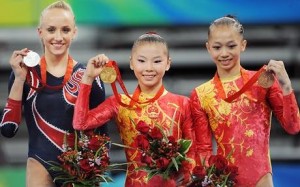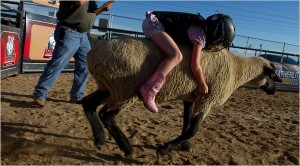NOTE: A version of this piece was syndicated on BlogHer! Check it out by clicking HERE.
This past weekend I enjoyed watching the kick-off to the US women's gymnastics season at the Covergirl Classic, which featured the "comebacks" of Shawn Johnson and Chelsie Memmel, the continued dominance of Alicia Sacramone, and the debut of several new stars. Of course the veterans "coming back" are around 23-years-old, and the newcomers are 15. I also watched the first night of the FINA World Championships on Sunday as the US women took silver in the 4x100m free relay. There, again, a 16-year-old "newcomer" (Missy Franklin) performed well, alongside a 28-year-old "veteran" (Natalie Coughlin).
These newcomers and veterans are preparing for the London Olympics, now a little more than a year away. Age always makes a good story in sports coverage (recall from the 2008 Games, for example, the prodigies, like Shawn Johnson, and the elder states[wo]men, like Dara Torres). But age is also often the source of controversy. For example, did the Chinese lie about the ages of their gymnasts to give them a physical advantage? We know they did in 2000, as did the North Koreans in 2004. You only have to look at pictures (like the one I included below) of the more womanly eighteen-year-old Nastia Liukin next to the sprite-like sixteen-year-old He Kexin to wonder if Kexin might actually be fourteen instead (you must be 16 during an Olympic year to compete in women's artistic gymnastics).

Lest you think that age cut-offs, limits, and controversies are limited to elite levels of sport, look no further than your local soccer field or Little League diamond. Parents often lie about the age of their children to try to give them a competitive advantage. Perhaps the most notorious case of a parent lying about the age of a child was not in activities I concentrate on in my research (like chess, dance, soccer, and child beauty pageants), but in Little League baseball. In 2001, during the Little League World Series in Williamsport, Pennsylvania, Danny Almonte’s father and coach forged the boy’s identification papers, saying he was twelve. Danny was actually fourteen and hence ineligible to play Little League. After he pitched a no-hitter and lead his team to a third place finish, the deception was discovered and the team’s placement was stripped.
Other cases are less extreme, but do occur, and in a range of activities. In her work on girls’ softball Jennifer Ring says that savvy parents try to conceive to best complement their children’s sports “careers,” so a child will be older in their birth year. Other parents, like Almonte’s, simply tamper with birth certificates to give them an edge. This happened on the New England child beauty pageant circuit where I did research. A mother lied to multiple pageant directors, saying her daughter was three, but she was actually five. Being younger allowed her to qualify for, and to win, the "0-3 Grand Supreme" titles.
Giving children an edge in terms of age has the biggest effect in athletics-- what is known as the “relative-age effect." But it also happens when it comes to academics as well. In a practice known as “academic red-shirting,” parents of many children, especially boys, are held back from entering kindergarten; a handful of my chess boys were red-shirted in preschool or pre-kindergarten. As with sports, some parents will report “timing the conception of their children with [academic] redshirting in mind”. Notably, redshirting basically did not exist fifty years ago. This process would not exist today if there were not competitive consequences in being “behind” in the competitive hierarchy. This is additional evidence that there are now structures in place to help put kids in the best position to feed into a system of competitive positioning that is happening earlier and earlier in children’s lives.
Sometimes parents don't cheat per se—but they certainly game the system. Many of the parents and teachers I met had learned to manipulate competitive activity systems in order to maximize the chance of winning. For instance, some dance routines have younger children added to bring down the average age of the group (you hear talk of group ages on Lifetime's Dance Moms). Parents’ willingness to game the system across activities shows that they are often more concerned with their children winning, even in a manipulated system, than getting a fair outcome. The focus is often on winning at any cost, which is a lesson passed on to the children.
ETA: The New York Times ran a story on July 30, five days after I published this post, on the Ugandan Little League team. The team members were denied visas to enter the United States on the grounds that, "some of the visa applications included birth records that 'several parents admitted had been altered to make some players appear younger than they actually are.'” I am sure that this was a combination of poor records (note the last line of the article, "'A kid may not know his birthday,' Stanley said. 'They don’t have cake and ice cream.'”) and parents hoping that their kids could get to the US and perhaps a better way of life. Nonetheless it's not right to lie about a child's age or to expect younger kids to compete against older kids no matter the circumstances. That said, it seems like parents/authorizes are most likely to LIE about children's ages when they come from poorer countries or repressive regimes (Uganda, Dominican Republic, China, for example); whereas more affluent parents, like those in the US, are more likely to manipulate their children's ages to give them the best advantages within a particular system.

